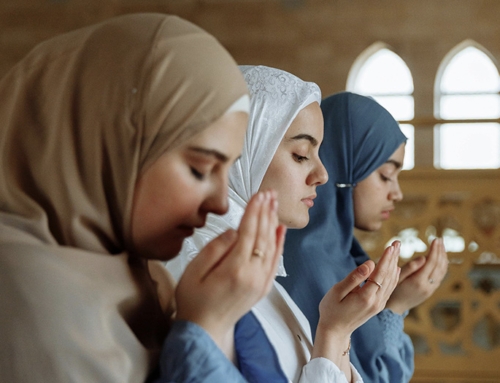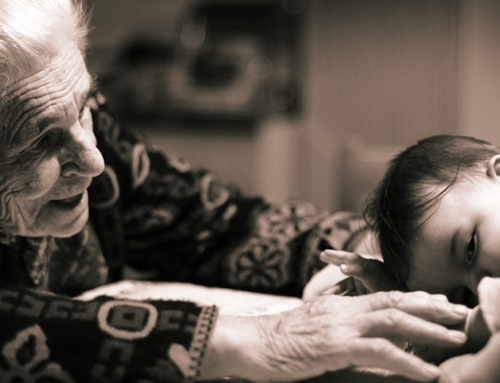By: Melissa Barreto
Losing a Non-Muslim Loved One as a Convert: Your Guide to Navigating Grief
To the convert grieving the loss of thier non-Muslim loved one:
You are not alone.
When my mother passed, it was unexpected.
The phone call came at night. I was folding laundry. I picked up the call and when my brother’s voice cried out through the speaker, a part of me shattered.
I felt so many things in that moment: shock, disbelief, pain, more shock, confusion, more pain. I remember having the overwhelming urge to leave, to be anywhere other than where I was, listening to what he was telling me. “Dead.” “Ambulance.” “I don’t know.” “Gone.”
Soon after, I phoned my husband and told him to book me the first flight home, to her home. Then I went to the living room and told my children that their abuela had died. We sat and cried together.
Grieving as a Convert: Balancing Loss and Family Needs
Inna lillahi wa inna ilayhi rajioon: From Allah we come and to Allah we return.
The month that followed my mother’s death was a whirlwind filled with tasks and to-do lists. Information to gather, family to support, decisions to make, belongings to pack. I had so many emotions and so many questions but very little time to process and reflect. Through it all, I also had to manage being the only Muslim, and visible one at that, in my family.
Having a loved one pass is never easy. But for converts, it can be especially difficult navigating how to grieve your loss, be present for your non-Muslim family, and uphold your own practice at the same time.
Below are some points that may be of help to those grieving a loved one, especially converts.
Your Feelings are Not a Sign of Weak Faith.
With grief comes a wide range of emotions. You can google countless articles about the stages of grief: shock, denial, guilt, depression, acceptance, hope. Sometimes you may feel like you’re going through all of them at once while other times you may feel overcome by just one.
However you feel, know that it is not a reflection of your faith but simply a normal and very human response to loss. Trying to bury your emotions in an effort “to be strong” is likely to only make your grieving process harder.
Grief and Faith: Insights from Prophet Muhammad and Prophet Yaqub
The Prophet Muhammad, peace and blessings be upon him, is known as the best example from mankind. His mental, physical, and spiritual strength are unmatched. Yet, he openly showed his sadness and grief when he lost his loved ones.
In the same year, he lost both his wife, Khadija, may Allah have mercy on her, and his closest uncle, Abu Talib. The Prophet’s sadness was so great that the time period became forever known as “The Year of Sorrow” in recognition of his loss and the impact it had on the community. Even years after Khadija’s death, it’s narrated that the Prophet, peace and blessings be upon him, became overcome with emotion at the unexpected sight of her necklace (Women Around the Messenger).
When Prophet Yaqub (Jacob), peace be upon him, learned the news that his son Yusuf (Joseph), peace be upon him, was gone, his grief was so great that he actually lost his sight. But never was his faith in question because of this. On the contrary, his story is upheld in the Qur’an as an example of great patience and trust in Allah’s plan.
These examples from our tradition show that being faithful and feeling grief are not at odds. In fact, the Prophets, who were the most faithful, understood that difficult human emotions in times of loss are natural and were unafraid to let themselves be moved by them.
Trust in Allah and Turn to Him Often.
While you navigate your grief, it’s important to remember that whatever we face is from Allah, the Most Wise. We cannot get so lost in our emotions that we begin to blame Allah, or question our Islam because of our trials.
“Sadness and feeling pain are emotions from Allah,” advises Ustadha Alia Dada, who was raised in a mixed-faith family, daughter to a Catholic mother and Muslim father. “Knowing we would have these feelings, He (Allah) wants us to rely on Him and come closer to Him. Blaming him is the opposite of that.”
Whatever hardship Allah puts on our path is there to teach us, purify us, and to bring us closer to Him. He knows what you are feeling. And He is the best one to turn to for guidance and relief. Try not to get so overwhelmed that you stop relying on Allah and lose your relationship with Him.
“In the same way that we trusted Allah to guide us to Islam, we need to trust Allah in everything else,” says Dada. “He will compensate you in some other way for your loss. Trust in the decisions He makes for your life.”
When the Prophet’s young son, Ibrahim, was dying, he openly wept in front of his companions. When they asked him about his show of feeling, the Prophet, peace and blessings be upon him, replied:
“The eyes are shedding tears and the heart is grieved, and we will not say except what pleases our Lord,” (Sahih Bukhari).
The Prophet, peace and blessing be upon him felt the normal pain that any human would when they lost a loved one and as a result he wept like all people do. However, this did not lead him to utter a word against Allah.
Be Present for Your Family.
I know this one may be tough. It’s not uncommon for converts to have strained relationships after accepting Islam. But when a loved one dies, the need to grieve as a family, despite your differences, is great. It’s worthwhile to consider the message that’s sent when you, as the only Muslim in the family, walks away in times of difficulty.
“Your presence can go a long way,” says Imam Abdullah Daniel Hernandez, PHD Candidate, Imam of the Muslim Association of Lehigh Valley, Co-Founder of the 3 Puertorican Imams and convert to Islam. “Participate and attend funeral services with the intention of helping your living relatives…by having a presence you have an opportunity for dawah (to educate others about Islam).”
I felt a huge pull to be with my family after my mother passed. I also had logistical concerns knowing the environment wouldn’t always be Islamic. Some days were more challenging to navigate than others, but I’m grateful for the time I spent with them. Circumstances aside, grieving together rekindled a sense of closeness between us. Had I chosen not to attend, I could have completely missed that opportunity to bond with my family.
Balance Faith and Family
Of course, every individual will have to assess their own situation and weigh out the potential for benefit vs. harm. Practices or environments that are clearly unIslamic should be avoided to the best of your ability, but beyond that there’s no reason why you can’t mourn with your family and try to help one another during a trying time.
“Allah wants us to try as much as we can. Whatever is beyond our ability is beyond our control,” says Hernandez. “Support the family to the best of your ability. Ask yourself: How can you bring benefit?”
Remember that times of mourning are not times for heated debates and arguments about life choices. If you choose to be present, aim to be there peacefully and compassionately. Your dawah can be just as much about what you choose to not say or do as what you do.
Seek Help When You Need It.
It’s a lot when someone you love dies. There’s no way around it. All you can do is let yourself move through it and leave everything else to Allah, the Most High.
Turn to Allah, at any time, in all times. Recite words of remembrance and supplicate to Him. Spend your nights and early mornings in prayer. Read Qur’an every chance you get. Leave it all with Him, the Most Wise, the All Hearing, the All Seeing.
“Befriending the Qur’an is the best support,” says Hernandez. “Strengthen your connection with the Qur’an. Seek that comfort from Allah and the Quran and put your trust in the One that never dies.”
It is also helpful to have someone to talk to, someone who can understand your perspective and help you to not feel so alone. I will never forget the Muslim sisters who came to my mother’s funeral purely to keep me company. Their simple act of being present greatly helped to relieve my burden on a difficult day. May Allah reward them immensely, ameen.
Find Solace in Community
Reach out when you need to. If you are married, find ways your spouse can support you. If you are unmarried, reach out to a friend or community member. Community and being with others is an important part of the grieving process. If it’s stories of strength that you need, look to the the life of the Prophet Muhammad, peace and blesssings be upon him.
“The seerah is such a powerful tool to remind us of our purpose in life,” says Dada. “This life isn’t supposed to be easy. It’s a test and we will get through it.”
Sometimes our grief can become so great that we need a professional to help us work through it. There’s nothing wrong with this and community counseling services can help.
“We need to take care of our traumas and heal,” says Hernandez. “We cannot expect the imams to have all the answers. Sometimes we have to humble ourselves and ask.”
Have Hope.
When your loved ones pass, some Muslims may be insensitive by starting discussions of whether your loved on died as a Muslim and where they think this leaves them in terms of the afterlife.
Please ignore these individuals. It brings no benefit to inquire or attempt to make declarations about any other person’s hereafter, especially to a person who is grieving.
“We don’t know who is in the Hellfire unless a text specifies it for us,” says Imam Yusuf Rios, a Puertorican convert to Islam and Co-Founder of the 3 Puertorican Imams. “There is no necessity to try and designate where a person is. That’s the role of Allah.”
“We don’t sentence them because we don’t know their reasons or what they believed internally,” says Hernandez. “Maybe they were never asked or maybe they were incapable of processing what they were being asked…If they don’t make the shahada then we are left with hope.”
Allah, The Most High, is the one who created us and He is the One who decides where our final destination will be. And we must ultimately trust that Allah is the most Just and Merciful.
Put your hopes in Allah and in His mercy. Focus on your own spirituality, appreciate and remember your family for all the good that you can, and leave the matters of judgement and decision to Allah so that you can move forward peacefully, inshaAllah.
Resources to Help
If you are in need of professional counseling to help you through your grief, please reach out.
- ICNA RELIEF COUNSELING (NJ)
https://icnarelief.org/muslim-family-services/ - AMANAH FAMILY COUNSELING (DMV)
https://www.amanahcounseling.com/bio-csgz - SAKINAH COUNSELING (CA)
http://www.sakinacounseling.com/ - MAPS NETWORK (TX)
https://www.mapsnetwork.org/
Melissa Barreto is a homeschooling mother of 5 children and Co-Founder of Wildflower Homeschool Collective, an NJ-based Islamic homeschool organization. www.learnwithwildflower.com
Got Questions?
We have Answers. Get in touch now.








